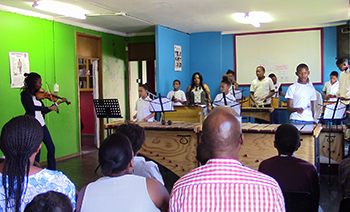
Sehle Mosole, left, and Jonandrea Pofadder back,
with the children from the ROC Foundation during the
second OSM community outreach in Heidedal, Bloemfontein.
Photo: Supplied
“The project is special because it is an event in the community, by the community.” This is what Gerda Pretorius, lecturer in the Odeion School of Music (OSM) at the University of the Fee State, said about the second music concert hosted by the OSM in Heidedal, Bloemfontein.
The concert, in collaboration with the Reach Our Community (ROC) Foundation on 26 November 2016, was a follow-up on the concept that was started last year. As part of the outcomes of the MUSE3706 module, the third-year Music Education students engage in a project in a specific environment. For this project the MUSE team, led by Pretorius and Anchen Froneman, collaborated with the ROC Foundation in Heidedal. Two third-year students in the OSM, Sehle Mosole and Jonandrea Pofadder, facilitated the event in 2016.
Long relationship between ROC and UFS
Since 2008, the UFS has successfully partnered with ROC through service-learning and community-engagement projects in which students from across all seven faculties participate. The foundation strives to address the challenges resulting from factors such as poverty, unemployment, HIV/Aids, single parenting, lack of guardianship, and physical and sexual abuse. In the Afterschool Care programme, the children engage in educational, cultural, and recreational activities.
Children who form part of the foundation’s Afterschool Care programme, showed their impressive music skills to their parents and guardians in attendance.
Spontaneous participation by community
“I was deeply touched by the spontaneous participation and appreciation of the community for art-related – in particular music and dance – events,” said Pretorius. A highlight was the community’s involvement in the event and the value it adds to the students’ organising skills.